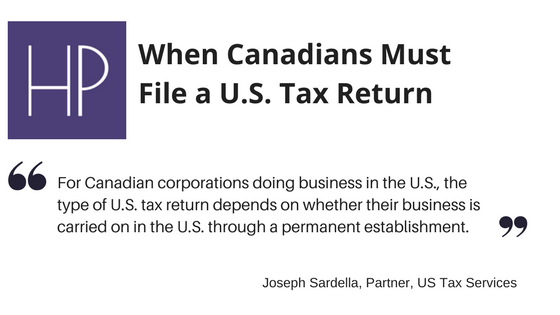Canadian corporations and individuals with business interests in the United States are often confused about when to file a U.S. tax return.
Canadian individuals providing services to U.S. customers or Canadian corporations engaged in a U.S. trade or business are required to file a U.S. tax return with both the Internal Revenue Service (IRS) and possibly U.S. states to report their income received from U.S. sources. This U.S. tax filing is in addition to the Canadian tax filing requirement of reporting worldwide income.
An individual who is not a U.S. citizen, U.S. resident alien or green card holder reports U.S. source income on Form 1040NR, U.S. Nonresident Alien Income Tax Return. Canadian corporations providing goods or services into the U.S. report their U.S. source income using Form 1120-F, U.S. Income Tax Return of a Foreign Corporation.
U.S. source income connected to a U.S. place of business is reported net of deductions and taxed at a graduated rate or at reduced rates under the Canada-U.S. income tax treaty. Passive U.S. income, such as dividends, are taxed at a flat tax rate.
For Canadian corporations doing business in the U.S., the type of U.S. tax return depends on whether their business is carried on in the U.S. through a permanent establishment. A permanent establishment is defined in Article V of the Canada-U.S. tax treaty as a place of management, branch, office, factory or workshop. It includes having a person physically located in the U.S. who exercises an authority in the
U.S. to conclude contracts for the corporation. It does not include either the mere purchase of goods or merchandise or the mere provision of executive, managerial or administrative facilities or services. Carrying on business in the U.S. through a permanent establishment requires the filing of a U.S. branch tax return, Form 1120-F, and paying U.S. corporate tax on U.S. taxable income.
Carrying on business in the U.S. without a permanent establishment requires the filing of a U.S. protective return, also Form 1120-F, but in this case, it is a Treaty based tax filing. The return asserts to the IRS that although the Canadian company has U.S. source income, it meets an exception from U.S. taxation under provisions of the Canada-U.S. tax convention. Failure to file a Treaty protective return on time can result in significant U.S. penalties and the loss of the desired Treaty protection. Penalties are imposed on the gross U.S. revenues at a tax rate of 30% without regard to any tax deductions.
Knowing whether your business has a permanent establishment is critical to filing the correct U.S. tax return. Where U.S. source income is taxable in the U.S., Canadian corporations and individuals can claim a foreign tax credit on their Canadian tax return for U.S. tax paid, thereby avoiding double taxation on U.S. source income.
A Canadian corporation that carries on business through a permanent establishment in the U.S must file Form 1120-F by the 15th day of the 4th month after the end of its tax year. Assuming a year end of December 31, the tax filing is due April 15 of the following year.
A Canadian corporation carrying on business without a permanent establishment in the U.S. must file Form 1120-F by the 15th day of the 6th month after the end of its tax year. A corporation with a year end of December 31 must file a tax return on June 15 of the following year.
An extension of time to file a tax return may be requested by the corporation. The request must be made by the original due date; the extended due date will be 6 months after the original filing date for a corporation that carries on business through a permanent establishment and 4 months after the original filing date for a corporation carrying on business without a permanent establishment.
An extension of time to file a tax return does not extend the time to pay a tax liability; the liability must be paid by the original due date.
Individuals who are non-U.S. persons or residents with U.S. source income are required to file U.S. tax returns by the June 15 of the following year unless they have tax withholdings at source (ie. from employment income) in which case the filing deadline is April 15.
All U.S. tax filers are required to have a taxpayer identification number. For individuals, this number is an Individual Taxpayer Identification Number and can be obtained by filing Form W-7. For corporations, this number is an Employer Identification Number and can be obtained by filing Form SS-4. Once a number is
assigned, the IRS will process the tax return.
Interested in learning more about filing U.S. tax returns? Contact us!
